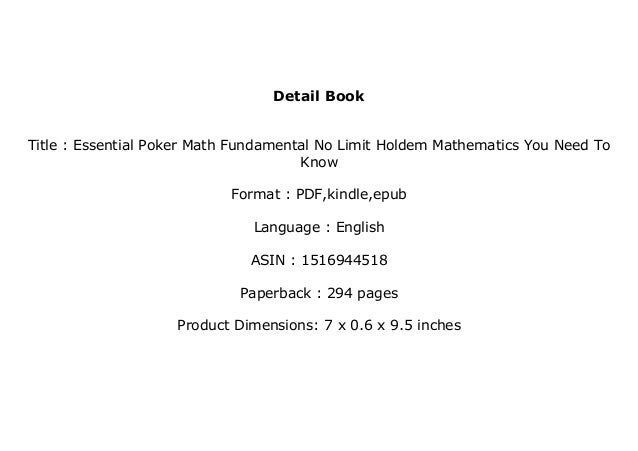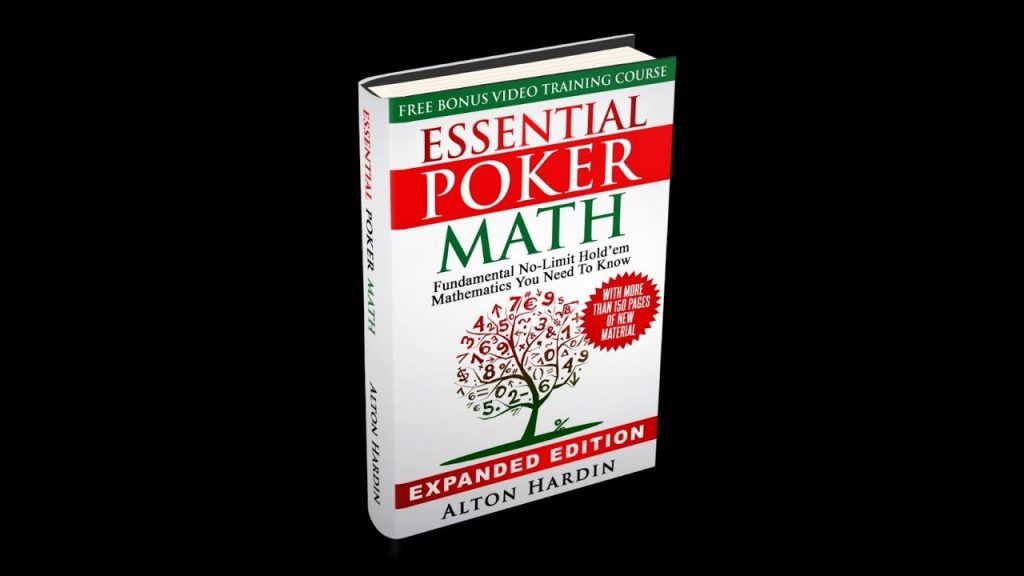Essential Poker Books
While interacting with fellow players in discussion forums, watching a training video presented by a seasoned pro, or reading a blog on your favorite poker site are all excellent ways of improving your game, there will be times when even the most digitally integrated of us want to step away from the laptop for our poker fix.
Buy Essential Poker Math: Fundamental No Limit Hold'em Mathematics You Need To Know by Hardin, Alton (ISBN: 514) from Amazon's Book Store. Everyday low prices and free delivery on eligible orders. EXCLUSIVE POKER BOOKS CONTENT. Get this article as a beautiful, easily save as a PDF or print for daily use. Get a beautiful infographic of the top 10 poker books in 2020. Get a free copy of my popular eBook “21 Secrets to Dominate the Poker Tables Like a Pro“. Hold’em Poker for Advanced Players by Mason Malmuth (1993 Edition). Malmuth is one of only two authors to receive two nominations in the top 10. If any book was a “must read” for all. Essential Poker Math, Expanded Edition – by Alton Hardin Math is essential to poker, and if you strive to be a winning player, you need to learn the fundamentals of the game. It is exactly what Alton Hardin’s book will do for you, offering a simple and straightforward guide that will teach you everything you need to know.
Fortunately, there is a wealth of terrific poker material available in long-form, with some of the game’s most revered analysts having published books in traditional and electronic form.
Theory of Poker. Author: David Sklansky. This is the book that started it all, in a way.
Before we take a look at our favorite poker books, let’s consider something Daniel Negreanu stated in a post he wrote about selecting one. In poker, one should not separate the author’s achievements from their work. Unlike many other competitive pastimes, knowledge about poker has to play out as success at the tables.
Essential Poker Books For Beginners
While many experts on sporting technique and strategy were themselves never competitors at the highest level of their areas of expertise, this should not be the case with poker. Pay attention to who the author of a particular book is. Find out what their achievements are before putting stock in their views. This is solid advice when exploring poker literature.
1. Gus Hansen: Every Hand Revealed
There are few players to whom a “window into the mind of” would be more fascinating than Gus Hansen and with this publication, the eccentric and massively successful Dane gives us just that.
The innovative concept behind this book would surely have been enough to render it a worthy read, but, as it turns out, the content is absolutely stellar too, giving insight into the thought processes that drove a remarkable tournament performance.

Here’s some background: In 2007, Mr. Hansen won his fifth major title when he became the Aussie Millions Champion, outlasting more than 700 players to take home an astonishing $1.2M in prize money.
Every Hand Revealed is the inside story of that victory. It is an unprecedented analysis of over 300 hands in which one of the game’s most popular and enigmatic figures reveals the reasoning behind every single decision he made on his way to the final victorious hand.
About the author
Gus Hansen has reported live winnings well over $10M and was, at the height of his success, ranked 11th in the Global Poker Index (GPI)’s All Time Money List Best Rank.
2. Bertrand “ElkY” Grospellier: The Raiser’s Edge
Possibly the most relevant publication in terms of unpacking the current Loose Aggressive (LAG) style of poker employed by today’s most successful players, The Raiser’s Edge has far more going for it than just a clever title.
Focusing only on tournament strategy, the book helps readers understand the stages and spots where and how to employ a LAG approach and even when to shift to hyper-LAG. The book also deals with how to defend against a player who is bossing the table with this particular strategy.
The Raiser’s Edge doesn’t compromise its value by having too narrow a focus, however, with a significant portion of the book also focusing on innovative, but extremely valuable, concepts like opponent nationality and age.
A guest-chapter, written by leading body-language expert Steve van Aspelen – a man who regularly assists the Australian police force in suspect interrogation – focuses on spotting and interpreting physical “tells”. This novel inclusion elevates The Raiser’s Edge to must-read level for players who focus on live tournament poker.
About the author
With over $13M in live winnings, Bertrand “ElkY” Grospellier is one of the world’s leading tournament players. His groundbreaking style of play, and his remarkable ability to explain it coherently makes him one of the most popular figures in the world of poker.
3. Mike Caro: Caro’s Book of Tells: The Body Language and Psychology of Poker

Mika Caro’s book, as you may have guessed from the title, deals entirely with the art of interpreting your opponents’ physical behavior. The ability to pick up clues about a player’s cards based on a combination of shrugs, sighs, shaky hands, eye contact, and many more is invaluable, and here Caro gives us 320 pages of information on this obscure topic.
Despite its length, the book only covers 20 basic tells but includes a significant amount of information on how each one can be interpreted based on certain conditions. It also defines how each of these tells can be exploited for maximum reward.
Critically, the book also deals with how to spot and respond to opponents who are deliberately exhibiting fake tells.

Bear in mind, though, that Caro’s Book of Tells is an influential piece of literature and is likely to have been read by a number of players at any given table.
About the author
Mike Caro is a professional poker player with seven WSOP “in the money” finishes under his belt. The 73-year old also contributed a chapter to Doyle Brunson’s seminal Super/System, one of the first ever books on poker strategy.
4. David Sklansky: The Theory of Poker
In publishing, the term “classic” is ordinarily reserved for texts that have influenced generations of readers, and, strictly speaking, this is entirely true of David Sklansky’s seminal effort.
Despite being published a mere 24 years ago, The Theory of Poker could easily be regarded as being outdated, given how quickly the game and meta-game has evolved in recent years. However, nothing could be further from the truth since the book focuses on introducing and demystifying the fundamental logical and mathematical concepts that drive a winning poker player’s decisions.
It is rightfully regarded as setting the benchmark for poker debate and is pretty much as essential as reading can get.
About the author
It may not come as much of a surprise to those familiar with his legacy to learn that David Sklansky practiced as an actuary before taking up poker as a full-time profession. A three-time World Series of Poker bracelet winner, Sklansky is predominantly a live player and boasts career earnings in excess of $1.3M.
5. Dan Harrington: Harrington on Hold’em Vol. 1: Strategic Play & Vol. 2 Endgame
The first volume in a series of three was without a doubt the most influential work on the topic of tournament poker and introduced the world to many strategic concepts that are nowadays taken for granted, even at the micro-stakes.
It’s almost impossible to think that there was a time, not too long ago, when most tournament players were not taking their M-ratios into consideration. This concept was introduced by Harrington and Robertie and is widely regarded as one of the most important contributions to the poker lexicon.
While the books’ significant level of influence does render some of its knowledge less valuable than more contemporary offerings, it is still packed with a wealth of essential information and considered required reading for anyone interested in tournament success.
The second volume in the series narrows its focus to the final stages of the tournament – a topic so complex, the author felt it warranted a publication of its own. This volume deals with the fragile dynamics of playing when the money is in sight and the blinds and antes are starting to overwhelm the short stacks. “Endgame” navigates these complexities expertly, providing readers with an arsenal of strategies to employ during this crucial phase of the tournament.
Best Poker Books
About the author
Dan Harrington won the 1995 WSOP main event, has ranked as high as 8th on the All Time Money List Best Rank and boasts career earnings of over $6.5M.
Free Poker Books
The 72-year old also recently expanded his bibliography by publishing two new volumes dealing with cash poker.
Bonus. Jared Tendler: The Mental Game of Poker
As an exception to the rule mentioned in our introduction, here is one book written by a non-player that has received such recognition that it is impossible not to include it in our list.
Psychology plays a bigger role in poker than most other competitive pursuits since it’s the only game in the world where a good player can continuously play well but still lose. The mental repercussions of losing a big hand or running bad for two months can ruin a tournament or, in extreme cases, a career.
This highly insightful book helps serious players overcome the challenges they will face when their emotions become involved in their decisions. It provides an actionable approach to dealing with tilt and it has been hailed by several WSOP bracelet winners, including 2012 Main Event Champion, Greg Merson, as having revolutionised their game.
About the author
Former mental health practitioner, and holder of a master’s degree in psychology, Jared Tendler, is a coach to over 500 professional poker players. His now defunct podcast, The Mental Game, has over 4.5M downloads and is still considered one of the most valuable resources on the psychology of poker.